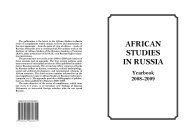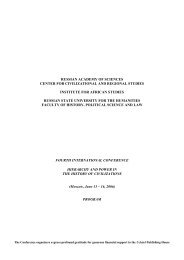Bondarenko Dmitri M. Homoarchy
Bondarenko Dmitri M. Homoarchy
Bondarenko Dmitri M. Homoarchy
Create successful ePaper yourself
Turn your PDF publications into a flip-book with our unique Google optimized e-Paper software.
96<br />
fact, from the viewpoint of society as a whole, that was appointment by a<br />
small group of people, only to which the appointees were responsible. Due to<br />
this they functioned as bureaucrats in many respects pointed out by Weber (see,<br />
e.g., Romano 1987; Zannini 1993). The tendency to gradual transformation<br />
into an oligarchic bureaucratic state (at formal legal equality of all citizens) also<br />
clearly revealed itself in the course of the Novgorod Republic’s history until the<br />
tendency was stopped at a very late stage, if not after its full realization, as an<br />
outcome of Novgorod’s integration into the Moscow Kingdom in 1478<br />
(Bernadsky 1961). The integration was predetermined by military defeat from<br />
Muscovites in the Shelon’ river battle seven years earlier; characteristically,<br />
“degeneration of the Novgorod feudal democracy into open oligarchy during<br />
the 15 th century led to lack of support of the boyar (patrician. – D. B.)<br />
government by the city lower strata. Just this determined the defeat of the<br />
republic” (Khoroshkevich 1992: 453–454). In the Hanseatic city of Rostock in<br />
the late 15 th – early 16 th centuries “… patricians formed not only the<br />
economically mightiest alignment of the city’s population”. During this period<br />
“they also concentrated in their hands absolute political power, the oligarchic<br />
character of the city self-government in the period under consideration<br />
increased. The right to sit in the city council was usurped by a limited circle of<br />
patrician families…” (Podaljak 1988: 131). The socio-political order of many<br />
other maritime trade-based independent cities of late-medieval Southern and<br />
Northern Europe eventually became basically the same (Schildhauer et al.<br />
1985; Brady 1991; Shaw, C. 2001). In contrast, even in so-called “oligarchic<br />
poleis” the whole collectivity of citizens remained the administrators’<br />
(magistrates’) elector at least in principle, though like in Venice and contrary to<br />
democratic polis, not all the citizens were eligible for being elected. To be<br />
sure: in oligarchic polis the circle of competent citizens was narrower than in<br />
democratic and only those belonging to an even narrower circle – oligarchy,<br />
could be elected. But oligarchs did not elect magistrates themselves like the<br />
Venice Great Council members did. Magistrates were elected by citizens of<br />
the oligarchs’ number (Jajlenko 1983: 165–173).<br />
The polis also should not be considered as a case when transition from<br />
(mainly) kin-based to (predominantly) non-kin social division outstrips the<br />
formation of bureaucracy, as first, there was no such a transition because it was<br />
inherited from the preceding incipient simple society (e.g., Andreev 1976;<br />
Frolov 1988) and second, bureaucracy never formed in poleis prior to their<br />
integration into the Macedonian Empire and the kingdoms which appeared on<br />
Alexander the Great power’s debris, when bureaucracy was just imposed on<br />
polis. Nevertheless they mainly preserved internal autonomy and typical nonbureaucratic<br />
system of government as a means of its realization and thorough<br />
support (e.g., Bikerman 1985/1938: 131–135; Allen 1983: 75, 109 et al.;<br />
Diakonoff et al. 1989: II, 322–330, 342–345; Fernoux et al. 2003: 89–114;<br />
Picard et al. 2003: 57–82). All in all, it is not so surprising that the polis is







